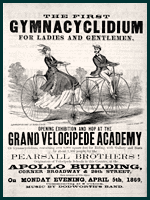
 |
Page 1 --
Introduction |
The Popularity of Broadsides |
Political Broadsides
Page 2 --
Reward Notice Broadsides |
Anti-Slavery and Civil War Ephemera |
Women in Ephemera
Page 3 --
Education and Health in Ephemera |
Travel, Industry and Labor Concerns in Ephemera |
Poetry and Verse in Ephemera
 |

"The first gymnacyclidium for ladies and gentlemen ..." |
The beginnings of collegiate intermural sports in Massachusetts is captured in the 1859 "Amherst Express. Extra." that covers contests between Williams and Amherst colleges in baseball and chess. Obviously gloating over Amherst's victories both in, "Muscle and Mind!!," the reporter offers the hope that such encounters will excite a deeper interest "in those amusements, which, while they serve as a relaxation from study, strengthen and develop body and mind." Instruction of quite another sort is described in an 1869 advertisement of "The First Gymnacyclidium for Ladies and Gentlemen," in the Apollo Building, on the corner of 28th and Broadway in New York City. Billed as the Grand Velocipede Academy, containing over 8,000 square feet for riding, with galleries seating 1,500 people, the proprietors offer lessons in bicycle exercise, competitive races, and expert exhibitions and amusements. Other advertisements offer a variety of goods and services including patent remedies for pain and a litany of common complaints, groceries and dry goods, meat packing, wool carding, shingle making, gold and silver plating, and real estate, especially western farm land being sold by railroads and other entrepreneurs.
 |
In an attractive tricolored chromolithographic circular featuring a lush rural landscape, The Burlington & Missouri River R.R. Co. offers "Millions of Acres" of Iowa and Nebraska Lands on ten-year credit. Free rooms and discount train tickets lure land-prospecting clients. And for those with a more adventurous spirit, the billowing sails of the clipper schooner Sarah, printed in bright red, beckons the immigrant-traveler to explore the "Free Trade & Free Lands of Magdalena," Lower California. For the farmer interested in the latest in labor-saving machinery of 1875, the manufacturer of "Gale's Patent Horse Hay Rake!" notes that it has taken the first premium at the Michigan State Fair for the past six years, is better than any other in the market, and is "so easily managed that a small Boy can run it with very little effort."
As industrialization brings many workers and immigrants to large cities, some see organized labor as a means to combating low wages, long hours, and poor working conditions. Coverage of speeches both for and against labor and calls for mass meetings of workers are frequent. The year 1886 marked the climax of the workers' efforts in many industries throughout the country to strike for the eight-hour day. In Chicago, in the aftermath of the May first general "walk out," several strikers were shot by police and a mass meeting was called for May 4 to protest police violence. Two versions of the 1886 handbill "Attention Workingmen!" announce this demonstration in Haymarket Square, Chicago, that led to one of the most famous labor riots in American history in which more than thirty policemen were killed or wounded by a dynamite bomb. Both versions of the notice are printed in English and German, but the rare first version includes the command: "Workingmen Arm Yourselves and Appear in Full Force!" This version was used by the prosecuting attorney in the Haymarket Riot case to prove that the inflammatory writings of demonstration organizers were responsible for the violence that ensued. August Spies, editor of the Arbeiter-Zeitung, argued that as soon as he saw the first version he ordered it destroyed and prepared the second version with the inflammatory phrase deleted. Nevertheless, he and six other anarchists were sentenced to death.
 |
It should be noted in closing that there is a significant sampling of verse from the eighteenth through the twentieth centuries scattered throughout the collection. Eighteenth-century offerings are often elegies, including two by Phillis Wheatley, or amateur polemics. Nineteenth-century representatives include the work of John Greenleaf Whittier and Julia Ward Howe, as well as variant lyrics set to well-known tunes. Recent literary selections include the work of Mark Van Doren, Thomas Merton, and Boris Pasternak. Gwendolyn Brooks's "We Real Cool" is reprinted by the Broadside Press.
Lastly, while the bulk of this collection was intended for transient mass consumption, the Gehenna Press broadside announcing the publication of Capriccio exemplifies a more contemporary form of ephemera. Featuring a book of poems by Ted Hughes with engravings by Leonard Baskin, this broadside is representative of a significant group of recent fine press and poet/artist collaborations created in limited editions for a very special clientele.
Page 1 --
Introduction |
The Popularity of Broadsides |
Political Broadsides
Page 2 --
Reward Notice Broadsides |
Anti-Slavery and Civil War Ephemera |
Women in Ephemera
Page 3 --
Education and Health in Ephemera |
Travel, Industry and Labor Concerns in Ephemera |
Poetry and Verse in Ephemera